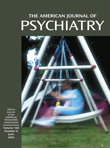Dr. Sokol Replies
To the Editor: The inconsistency of the D8/17 test reported by Dr. Hamilton and colleagues (1) indicates that work probably needs to be done to make the test more reliable as a diagnostic tool. This is particularly important because recent research (2) also points to a possible autoimmune process in some cases of eating disorders. Fetissov et al. (2) reported that there might be an autoimmune disorder involving specific brain structures responsible for feeding behavior in some cases of anorexia and bulimia nervosa.
Reprints are not available; however, Letters to the Editor can be downloaded at http://ajp.psychiatryonline.org.
1. Hamilton CS, Garvey MA, Swedo SE: Therapeutic implications of immunology for tics and obsessive-compulsive disorder. Adv Neurol 2001; 85:311-318Medline, Google Scholar
2. Fetissov SO, Hallman J, Oreland L, Af Klinteberg B, Grenback E, Hulting AL, Hokfelt T: Autoantibodies against alpha-MSH, ACTH, and LHRH in anorexia and bulimia nervosa patients. Proc Natl Acad Sci USA 2002; 99:17155-17160Crossref, Medline, Google Scholar



